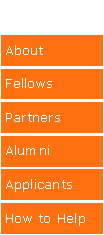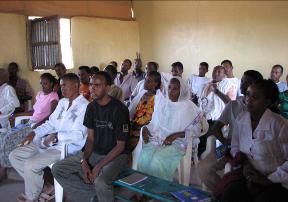
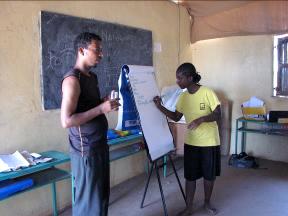
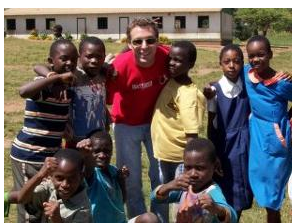

|
Other Upcoming Events…
PiAf Alumni Gathering and Open House May 30, Post P-Rade-6:00 PM in the NEW PiAf office (194 Nassau Street, Suite 219) Princeton in Africa alumni and friends are invited to catch up with one another and the program. PiAf staff will share highlights and recently returned Fellows will be present to discuss their experiences. |
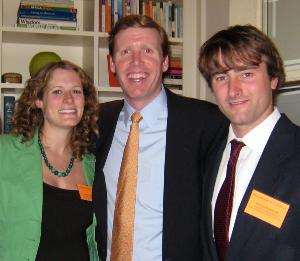
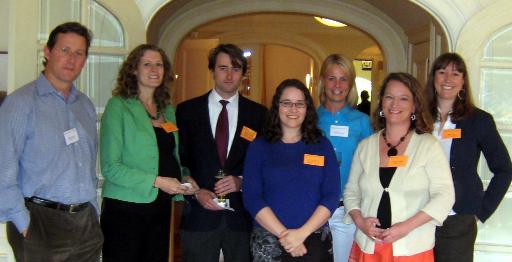



|
Fellows’ Flyer |
|
May 2009 |
|
News and views for and by Princeton in Africa Fellows |
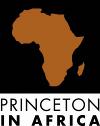

|
In this Issue: |
|
Highlights from 2008-2009 Fellows |
|
Happy Birthday |
|
May 8 Jasmine Clerisme
May 12 Aliya Sanders Tom Dollar |

|
PiAf in San Francisco
PiAf Foundation Board member Derek Schrier ‘89 and his wife, Cecily Cameron ’89, hosted a gathering of PiAf alumni and friends at their San Francisco home on April 30th. Many thanks to them and Temp Keller ‘98 for helping us spread the word about PiAf, and thanks as well to all who attended! Pictured below at left: Derek Schrier ‘89, Anne Gordon ‘01, Will Reinhardt ‘06, Jessica Hickok ‘02, Cecily Cameron ‘89, PiAf Executive Director Cordelia Persen, and Devon Watts ‘03. Pictured below at right: Anne Gordon ‘01, PiAf Foundation Board member Temp Keller ‘98, and Will Reinhardt ‘06. |
|
May 14 Alyson Zureick
May 17 Shelly Slemp
|
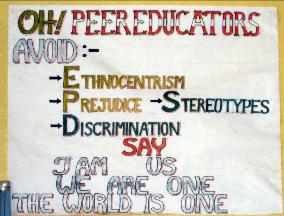
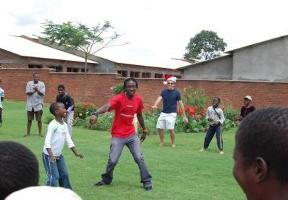
|
Mike and colleagues lead an energizer for members of Teen Club, Baylor’s monthly day of clinic visits, psychosocial support, and education for HIV-infected adolescent clients, at its annual Christmas party |
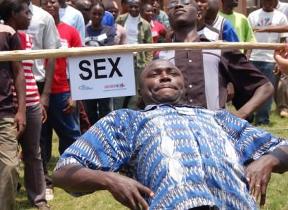

|
“Now you are a Phiri,” said Levi, one of my program staff, bestowing unto me the honor of a Malawian last name in response to my slowly improving (though still embarrassingly accented) Chichewa. As tiny as the gesture may have been, it meant something to me; in a place where azungu like me are so aggressively labeled as such by locals, every token of community acceptance counts for something. (“Does this mzungu understand Chichewa?” asked a high school principal, in reference to me, during a sensitization meeting this afternoon; “A little bit,” I replied in Chichewa, to his surprise.) Indeed, while working for the Baylor College of Medicine/Abbott Fund Children’s Clinical Centre of Excellence in Lilongwe, I have been thrust repeatedly into the local communities that comprise Malawi’s capital city, each time humbled by learning something else I didn’t know I didn’t know.
This cultural competency is essential to the work I do. My primary function at Baylor – destigmatizing and expanding the reach of HIV testing and education for young people – was previously untried in Malawi and thus initially daunting. In a setting where many children must work to support their families (often at the expense of education or other non-church activities), in which HIV/AIDS is stigmatized and misunderstood, and in which testing young people for HIV is mostly socially unacceptable, how are we supposed to engage, educate, and provide HIV testing for thousands of non-autonomous youth? And even if we successfully overcome these social barriers, how, in a setting with a highly mobile population and limited infrastructure, are we supposed to marshal the manpower and resources to make it happen? The answer in Malawi, I have learned, is to keep our work small-scale and no-frills and to take the message – and the HIV test – straight into homes, churches, schools, and community organizations. The social fabric of close personal relationships works to our advantage. By rooting our testing efforts solidly in the community, and with the support of community leaders, we make the largest and most sustainable impact. I am proud to report that, since November, my small program alone has tested over 750 people for HIV and graduated nearly the same number of youth from a ten-week curriculum of HIV/AIDS biology and prevention, sexual and reproductive health, and life skills supplied by Grassroot Soccer, a sport-for-development NGO.
As a rising medical student, I came to Malawi hoping to make some sort of clinical impact, and identifying and linking HIV-infected people to care certainly fulfills that goal. But after shadowing a Baylor doctor on the pediatric wards of Kamuzu Central Hospital, whose campus Baylor shares, and talking to variety of health workers, I realized that I could draw upon the broad and generous Princeton network (the same one that got me to Malawi in the first place) to make a different kind of clinical impact. In partnership with the Princeton Student Global AIDS Campaign, I have launched a project to raise $10,000 to purchase oxygen concentrators for the hospital, which provide an extremely cost-effective way to shorten hospital stays and save children’s lives. To learn more about the project and read testimonials from the hospital (“Stories from the Ground”), please visit http://webscript.princeton.edu/~sgac/malawi/. If you are interesting in contributing, please e-mail me at honigberg@gmail.com.
Thanks to a welcoming, close-knit community in Lilongwe and a beautiful surrounding country with ample possibilities for outdoor excursion, this year has also offered much exploration and growth beyond the realm of work. I have, for example, taken to (trail) running, an activity central to the local social scene, and have competed in races in Lilongwe and Cape Town as well as an open water swim in Lake Malawi. Beyond athletic pursuits, too, we Lilongweans are adept at making our own fun. Themed parties, typically requiring a trip to the chaotic downtown market to procure a costume, are frequent.
There’s something truly infectious about this place (beyond the intestinal parasites, that is). While I am deeply sad to be leaving in just a few short months, I can say with certainty that I’ll be back in the not-too-distant future. In the meantime, I’ll be motivated by the hard work and smiles of my friends and colleagues and the hundreds of children I met in Malawi, proud and humbled that our work in Africa and the United States has the power to transform lives in Lilongwe and around the world. |
|
by Mike Honigberg, ‘08-’09 Fellow at Bristol-Myers Squibb/Baylor Pediatric AIDS Initiative in Malawi |
|
Notes from the Field |
|
Mike poses with youth at a community HIV testing event in Lilongwe |
|
Community health workers and peer educators are trained in facilitating an innovative youth HIV/AIDS curriculum. This activity, called “Pressure Limbo,” discusses the effects of peer pressure on health-related behaviors. |

|
Nana teaching a cultural orientation class for refugees |
|
by Nana Boakye, ‘08-’09 Fellow at International Rescue Committee in Ethiopia |
|
Notes from the Field |
|
Some of the students in Nana’s class |
|
The first time that I traveled to Shimelba refugee camp, which was my first time ever visiting a refugee camp, this is what I recorded in my now-defunct blog: “My journey to Shire [the International Rescue Committee (IRC) field office for Shimelba Camp] was right out of The Last King of Scotland. Not the crazy, disemboweling Forrest Whitaker part. I mean the part when the white dude is cruising down the Ugandan road waving at excited passing children supplied with a kick-ass African soundtrack. As the driver and I traversed down this dirt road, shepherd children jumped up and down waving at us while the driver honked and I smiled and waved. It was exhilarating. Plus the driver somehow sensed my need for a kick-ass African soundtrack and put in a tape (yes, tape) of traditional Ethiopian music. This trip, I could tell, was going to be something special.”
Fast forward six months later. I am traveling to Shimelba to launch my pilot program—cultural orientation classes for approximately 700 Eritrean refugees being resettled to the United States. My curriculum was to include such riveting topics as “Public Urination: A Public No-No” and “Get a Job, Any Job.” On top of all this, I was to live in the camp for the next three to four months. On my way to the camp, these were the thoughts that I never bothered to record until now: “It’s so hot. It’s dusty. Oh my gosh, think about the damage to my hair and skin! Ugh, I guess I’ll just chop off the split ends when I get back. I wish the driver would turn down that music.”
I then proceeded to fall asleep for the next two and half hours.
I realized that something in me had changed fundamentally.Why was I no longer the excited novice marveling at all the wonders of Ethiopia? Was I now a jaded aid worker? That would be somewhat ridiculous being that I was not an “aid worker,” but rather an IRC intern who, moreover, had only been working for about six months. Then, I realized the answer. In the short time I had been in Ethiopia, I was no longer a novice. Granted, I wasn’t defusing landmines at the Eritrean border. Still, I had visited/stayed in my fair share of refugee camps and had seen quite a bit of rural Ethiopia. Consequently, these sights and these trips were no longer awe-inspiring. In some ways they were almost, and I should stress the word almost, quotidian.
My six months as a Program Intern had introduced me to various aspects of the humanitarian/aid world. I had learned loads about proposal writing, grant development and reporting, and IRC-Ethiopia’s country programs as well as the general mechanics of humanitarian machines. Additionally, due to my boss’s encouragement, I was spending about half my time in the field visiting our six refugee camps (three in the Somali region, two in Tigray near the Ethio-Eritrean border, and one in the Benishangul-Gumuz region near the Ethio-Sudanese border) as well as seeing the chat-chewing alhajis of the Somali Region, the white-clad devout Orthodoxes of Tigray, and the stoic Maban farmers of Benishangul-Gumuz.
Now, as I near the eighth month of my Princeton in Africa experience, I’ve come to terms with the fact that I will no longer see everything with the relentless wonder of traveler’s eyes. My priorities and sources of inspiration have changed. So what if slack-jawed camels and ornery Orthodox holy men no longer elicit “oohs” and “aahs” and musings on life? Now, I derive pleasure from grins of comprehension on my students’ faces when they finally understand Americans’ preoccupation with personal space. I enjoy their amused expressions when I outline what they perceive as convoluted American hygiene rituals (i.e. showering daily, brushing teeth twice a day, and regularly wearing deodorant).
I guess it was bound to happen. I’ve stripped off my safari jacket and those goofy Teddy Roosevelt spectacles signaling the end of the explorer phase of my PiAf experience. Now what can I turn to? I guess I could focus on the work itself. Go figure. |

|
This sign in Nana’s classroom reminds students and peer educators how to act |
|
New Fellows’ Reception June 1, 2:00-4:00 PM, 194 Nassau Street, Suite 219 A special Class Day reception for 2009-2010 Fellows and their families. Please join us as we send off our newest class of Fellows! |

